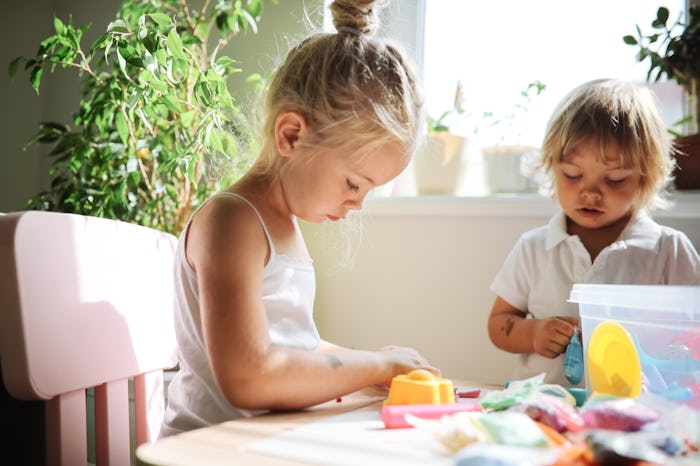Parenting

Imagination Is A Superpower & We Should Use It More With Our Kids
This Hasbro study on play and imagination has legit changed how I parent.
As a kid playing with copious amounts of Play-Doh for hours, it never crossed my mind that one day I’d have my own kids and that they, at 6 and 4 years old, would also be obsessed with the now-nostalgic, iconic compound. I certainly wouldn't have predicted that decades later, my favorite thing about Play-Doh would be that it fosters open-ended play.
Open-ended play is where children use their imagination and exploration without specific goals in mind. This could be pretend play, playing with building blocks, using magnetic tiles to build a castle or a space center, or playing with Play-Doh. Open-ended play might sound like a buzzy word used by Montessori influencers, but it’s genuinely so great for kids’ development.
As parents, we intuitively know fostering imagination is important, but to help drive home the idea, Hasbro conducted a mind-shifting study that offers new ideas as to how unstructured play shapes imagination in the moment and in the long term. The 2023 study, based on qualitative interviews with 9,000 parents and children in the U.S., U.K., Mexico, France, and Denmark, is applicable to all forms of open-ended play, and it has legit shifted the way I parent. A bold statement, I know, but hear me out.
The benefits of imagination
Imagination is a proven mood booster. And according to Hasbro’s study, 90% of parents associate an active imagination with happiness, mental well-being, and the development of important skills like independent thinking.
“Imagination is a process of exploring possibilities, so it helps us with our ability to find opportunities and solutions,” says imagination expert (really, that’s a thing!) Emma Worrollo, founder and play researcher at the Playful Den. Worrollo reminded me that all people benefit from having more playful experiences with imagination: “Imagination can also support the development of empathy and even help with memory. But one of the core benefits is simply joy. Imaginative play is fun and makes us smile.”
Imagination can support the development of empathy and help with memory. But one of the core benefits is simply joy.
What are the barriers to an active imagination?
The 2023 study shows that, for kids of all ages and adults, imagination is a use-it-or-lose-it muscle. On average, teens told researchers that they feel like their imagination decreased 16% between age 9 and their teenage years, and 75% of parents worry that their kids grow out of their imagination too quickly.
Almost 50% of the teens who participated reported that stress is the No. 1 reason for loss of imagination. The same number of teens feel that being imaginative isn’t a skill that modern society values, and two-thirds of parents feel the same way, in addition to not being prioritized by our education system.
“Younger kids don't concern themselves with how they are perceived, they share their imagination freely and it pours out of them,” Worrollo says. “As kids get older, they become more aware of how they are perceived and fear creeps in. This can affect how they explore their imagination. Imagination also needs space and encouragement; many tweens and teens don't feel the world encourages them to be imaginative.”
How does open-ended play foster imagination in kids and grown-ups?
The study suggests that, in order for imagination to thrive, “continued access to a variety of imagination challenges and experiences are needed.” In other words, imagination responds to practice, encouragement, and time — and it thrives on unrestricted playful experiences.
“Play-Doh and similar types of toys offer the quintessential blank canvas for your creativity to roam freely on a risk-free adventure,” says Jason Loik, a professional toy sculptor who appears on Freevee’s Play-Doh Squished. “There’s no designated ‘right way’ to play, granting you freedom to embark on an open-ended journey that serves as the bedrock of unfettered thinking and boundless creativity."
Play like this forces us to focus on process over product.
That low-stakes, risk-free aspect does feel critical and like it's a lot of what's missing from the life of the average grown-up. Think of a Magna-tile tower being knocked over with monster trucks (my son, all day every day) or the Play-Doh that gets smashed back into a rainbow blob: Impermanence is part of the appeal. Play like this forces us to focus on process over product.
Hasbro’s study was a great reminder for me to encourage my son to knock down his tower with his monster trucks if that’s what he wants to do (while offering gentle reminders to not knock over his sister’s) and to focus on the full experience of playing instead of the end result. I’ve also found that, now, when I stop what I’m doing — even if only for a few minutes — to play with them, it fuels my creative soul. And what fun it is to get to know more of their personalities by simply watching them play.
Regardless of what you're working with, giving them the tools to encourage exploration and imagination without any specific goals in mind is doing wonders for your child’s long-term ability to imagine — and yours, too, if you join in on the fun. And if you're stuck making dinner or working from home, at least make time to give your child’s Play-Doh a sniff — all the nostalgic, imaginative feelings will come rushing back. Seriously, it’s science.
Jill Layton started writing professionally when she realized her emails and texts were kinda funny. She’s currently a shopping and lifestyle contributor for Scary Mommy and is a ghostwriter for comedians — don’t tell anyone. She’s the mom of two alarmingly witty kids and the world’s most perfect dog, all of whom she shares with her wife.